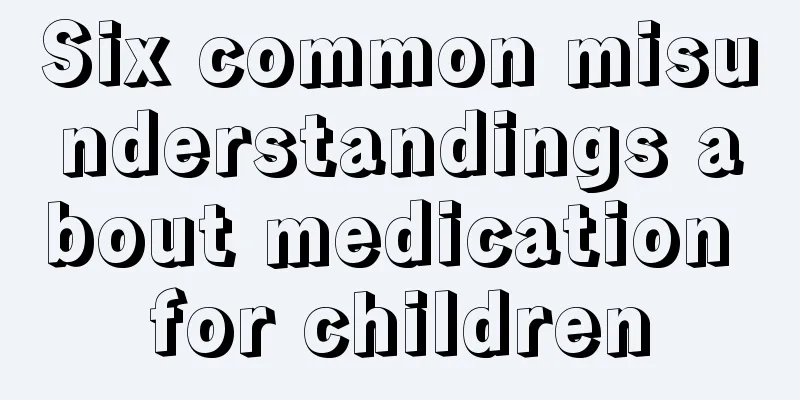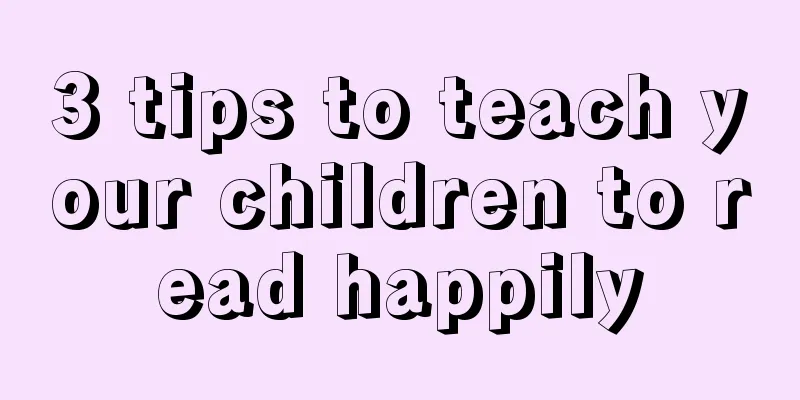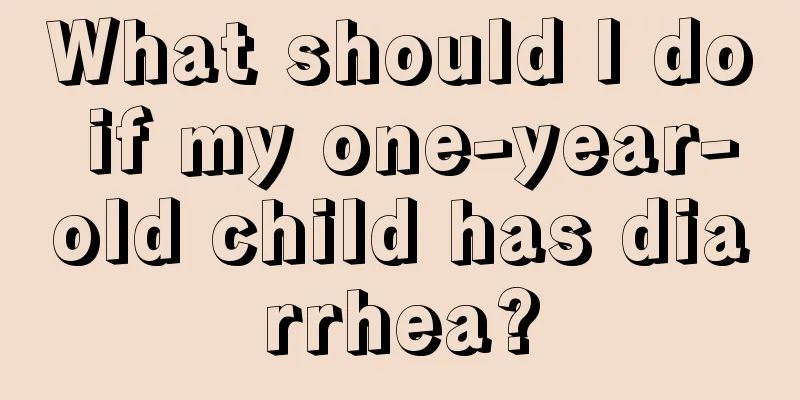Six common misunderstandings about medication for children

|
1. Misuse of antibiotics Epidemiological surveys have shown that more than 90% of upper respiratory tract infections are caused by viruses. Therefore, the routine use of antibiotics in upper respiratory tract infections is unreasonable and may also be threatened by adverse reactions. If antibiotics such as streptomycin, neomycin, gentamicin and kanamycin are used for a long time, it will also affect children's hearing and easily cause dizziness, tinnitus, and even deafness. For children under 8 years old, especially newborns, taking tetracycline and oxytetracycline can easily cause yellowing of teeth and poor development of tooth enamel, so children should not take tetracycline and oxytetracycline. 2. Abuse of antipyretics Fever is a necessary protective mechanism of the human body. Some young mothers believe that if their children take some antipyretics when they have a fever, the illness will be cured. Therefore, they always give their children antipyretics. In fact, such an approach is inappropriate and can easily create illusions to conceal the condition and affect the diagnosis and treatment of the disease. The average body temperature of a healthy person is about 37°C. The brain development of young children is not yet complete, and the function of the temperature regulation center is weak. Therefore, children will have a fever when they are sick, and other symptoms are not obvious, such as colds, pneumonia, measles, local infections, drug reactions, rheumatic fever, etc. Therefore, fever is an important sign for diagnosing children's diseases. If you use antipyretics to suppress the fever as soon as it occurs, it will often mask the condition, bring certain difficulties to diagnosis, and affect treatment. In addition, some antipyretics, such as aspirin, can affect children's coagulation mechanism, leading to bleeding in the skin, lungs, brain and other organs; for example, phenacetin can convert low hemoglobin in the blood of newborns into high hemoglobin, reducing the ability of red blood cells to carry oxygen, leading to tissue hypoxia, and in severe cases can cause cerebral edema, convulsions, coma, etc. Therefore, when children have a fever, the cause should be found out and then symptomatic medication or etiological treatment should be used. If the child's body temperature does not exceed 38℃, there is generally no need to use antipyretics. Just closely observe the child during treatment. Of course, if a child's body temperature is too high, such as reaching 39°C or above, it will seriously affect the child's health and may cause convulsions, seizures, etc. The correct approach should be to use appropriate antipyretics on the basis of active treatment, while adopting physical cooling methods, such as alcohol baths. 3. Abuse of vitamins Vitamins do play an important role in children's growth and development, but we should not blindly think that more is better. Many medicinal vitamins have certain adverse effects or even toxic reactions, especially fat-soluble vitamins. Excessive dosage or long-term use may cause accumulation in the body and lead to poisoning. For example, taking too much cod liver oil can cause fever, anorexia, irritability, and damage to liver and kidney function. Although water-soluble vitamins are relatively safe, they cannot be ignored. For example, taking too much vitamin C can induce urinary stones, brittle bones, etc. For this reason, nutritionists emphasize that the best choice for vitamin supplements is natural vitamins found in food. 4. Abuse of immunoglobulin Late winter and early spring are the peak seasons for colds. Some parents place their hopes for prevention on "immunoglobulin G". In fact, this approach is unscientific. Gamma globulin is made from mixed healthy human plasma and mainly contains immunoglobulin G (abbreviated as IgG). Theoretically, the concentration of IgG in the blood is related to the body's ability to resist infection to a certain extent, but the injection of immunoglobulin does not reduce the incidence of colds. There are two reasons for this: first, the pathogens of colds are mainly viruses, which are of many types and often change, while the antibodies contained in immunoglobulin G are not only limited but also lack specificity; second, the IgG level in the blood of healthy children and most weak children is normal. From this point of view, the key to reducing the incidence of colds in children is to strengthen their physical fitness. Specific measures include insisting on breastfeeding, arranging a reasonable diet, insisting on the "three baths" exercise (sun bath, air bath and water bath) from an early age, and timely vaccination. 5. Using expensive medicine for minor illnesses When a child is sick, parents want the disease to be cured immediately, so they often use new and expensive drugs. For example, when you have a cold or fever, you often use antibiotics, and sometimes you think penicillin is outdated and use cefotaxime instead. For example, for diarrhea, piperimic acid and norfloxacin are used without any reason. In fact, colds and fevers are mostly caused by viruses and have their own natural course. Antibiotics are ineffective. Not only can cefixime not change this situation, but it can also cause drug resistance. Once a severe bacterial infection occurs, it will be ineffective. The same is true for diarrhea. 70% of watery diarrhea is caused by viruses and toxigenic E. coli. Just drink more water, adjust your diet, and take some digestive enzymes and B vitamins appropriately to solve the problem. There is no need to use antibiotics. 6. Take medicine with sugar water Chinese medicine has a bitter taste and children are reluctant to take it, so their parents use sugar water to correct the taste. Little do people know that sugar contains more calcium, iron and other mineral elements, which can react chemically with the protein in traditional Chinese medicine, coagulate and denature in the gastric juice, and then become turbid and precipitate, greatly reducing the therapeutic effect. Some medicines use bitterness to stimulate the secretion of digestive juices and exert their therapeutic effects. If sugar is added to the medicine, it will affect its efficacy. In addition, sugar can interfere with the absorption of trace elements and vitamins, inhibit the effects of certain antipyretic drugs, and degrade the active ingredients of certain drugs. In short, taking medicine with sugar water is not conducive to curing the disease. The best way is to take it with boiled water. |
<<: There are five tips for children to drink water.
>>: Two secrets to cultivating children's patience
Recommend
How to improve baby's digestive system?
Generally speaking, the digestive system function...
Idioms describing children walking unsteadily
When a child just starts to learn to walk, he alw...
What to do if your six-month-old baby has asymmetrical leg lines
After the child comes out of the mother's bod...
What to do if children have wind-heat cold
Colds are common exogenous diseases in all season...
Why does my child always hiccup?
Hiccups are a common symptom in children. Even ad...
What causes children to always catch a cold?
If a child always catches a cold, then you need t...
When is the best age for weaning babies and what should we pay attention to?
We all know that there are many aspects that babi...
When is the best time for children to brush their teeth?
Teeth are very important for both children and ad...
Treatment of scab on baby's head
The incidence of scabs on babies' heads is ve...
Crying and refusing to sleep
For babies, if they cry incessantly and refuse to...
What is the cause of myopia in three-year-old children?
Parents have always regarded their children as th...
What are the treatment and prevention methods for children's night terrors?
Some babies often have night terrors when they ar...
The reason why newborns have white spots on their noses
The immunity of newborns is relatively low. Many ...
What causes baby's hands to peel?
Some babies have problems with their bodies, so t...
When do children lose their teeth?
Children's menstrual cycles and some precauti...









